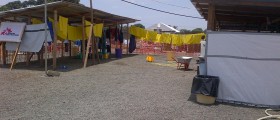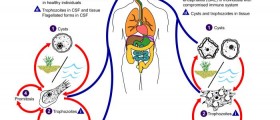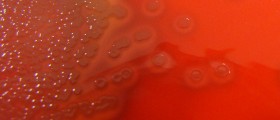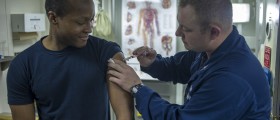
Dysentery is a frequent infectious disease that predominantly affects the intestine. It typically leads to diarrhea and stomach cramps and may sometimes be accompanied by nausea and vomiting. The condition may not be serious and symptoms and sings generally withdraw within a few days after the onset unless a person develops amoebic dysentery.
Types of Dysentery
There are two types of dysentery, bacillary dysentery and amoebic dysentery. The first one is caused by Shigella, a Gram-negative rod-shaped bacterium. The second type of dysentery develops due contraction of amoeba, a single-cell parasite, a member of a genus of Protozoa. Amoebic dysentery (amoebiasis) is more serious comparing to bacillary dysentery and predominantly affects people living in tropical areas. This is why amoebic dysentery is generally contracted while traveling abroad. It is essential to mention that amoebic dysentery carries risk of many serious complications and if left untreated, it may even cause lethal outcome.
Preventing Dysentery
Dysentery is infection that occurs due to lack of proper hygiene. The leading cause of the infection is, therefore, poor hygiene. Because of that the most successful means of prevention are related to maintaining impeccable hygiene. One is supposed to wash his/her hands each time he/ she uses the toilet. Hands also need to be washed prior food preparation and prior every meal. If a person from your surrounding is suffering from dysentery these measures must be even more rigorous and one is due to abstain from any direct contact with the infected person and avoid sharing certain items such as eating utensils.
For people who are traveling to countries in which dysentery is endemic measures of precaution become even more rigorous. Unfortunately, because such countries have little or no access to fresh water and there is not sufficient amount of disinfectants one must pay close attention and try to prevent infection as much as possible.
While traveling to countries in which amoebiasis is endemic a person is not supposed to drink the local water unless it is boiled. Boiling must last at least 10 minutes. It is even safer to consume bottled water. The potentially contaminated water may be also treated with filtering (by using 'absolute 1 micron' filter) and dissolving iodine tablets in the filtered water.
The person must never use tap water for cleaning teeth. Drinks must never contain ice which is made from the local water. Fruits and vegetables can be washed only with previously treated water and are supposed to be peeled prior consumption. Dairy products which have not been pasteurized are forbidden. And finally, one is advised not to eat or drink anything sold by street vendors.











_f_280x120.jpg)





Your thoughts on this
Loading...